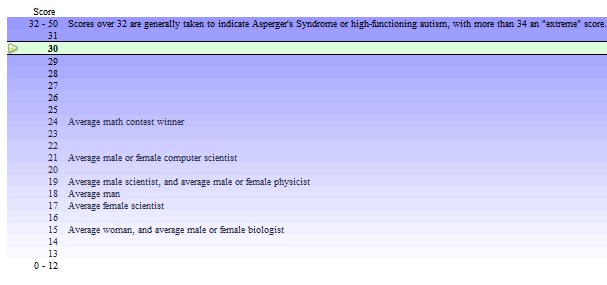


Strong systemizing requires excellent attention to detail, and in our view the latter is in the service of the former. Furthermore, we argue that excellent attention to detail exists in ASC because of evolutionary forces positively selecting brains for strong systemizing, a highly adaptive human ability ( Baron-Cohen 2008). In this paper, we argue that while savantism (defined as prodigious talent) is only seen in a subgroup of people with ASC, a universal feature of the autistic brain is excellent attention to detail ( Shah & Frith 1993 Jolliffe & Baron-Cohen 1997 O'Riordan et al.

This forces us to ask: why the link between talent and autism? This ‘comorbidity’ (or to use the more neutral term ‘co-occurrence’, since comorbidity is a strange term to use when one of the characteristics is not a disability) shows us that these two profiles are associated well above chance.

Savantism is found more commonly in autism spectrum conditions (ASC) than in any other neurological group (see Howlin 2009), and the majority of those with savantism have an ASC ( Hermelin 2002). We conclude that the origins of the association between autism and talent begin at the sensory level, include excellent attention to detail and end with hyper-systemizing. We review an experiment from our laboratory demonstrating sensory hypersensitivity detection thresholds in vision. Finally, we argue that the excellent attention to detail in ASC is itself a consequence of sensory hypersensitivity. Such law-based pattern recognition systems can produce talent in systemizable domains. By contrast, the hyper-systemizing theory argues that the excellent attention to detail is directed towards detecting ‘if p, then q’ rules (or reasoning). While both hyper-systemizing and WCC theories postulate excellent attention to detail, by itself excellent attention to detail will not produce talent. The ED theory has difficulty explaining the existence of talent in ASC. We then clarify the hyper-systemizing theory, contrasting it to the weak central coherence (WCC) and executive dysfunction (ED) theories. We argue that hyper-systemizing predisposes individuals to show talent, and review evidence that hyper-systemizing is part of the cognitive style of people with autism spectrum conditions (ASC).


 0 kommentar(er)
0 kommentar(er)
